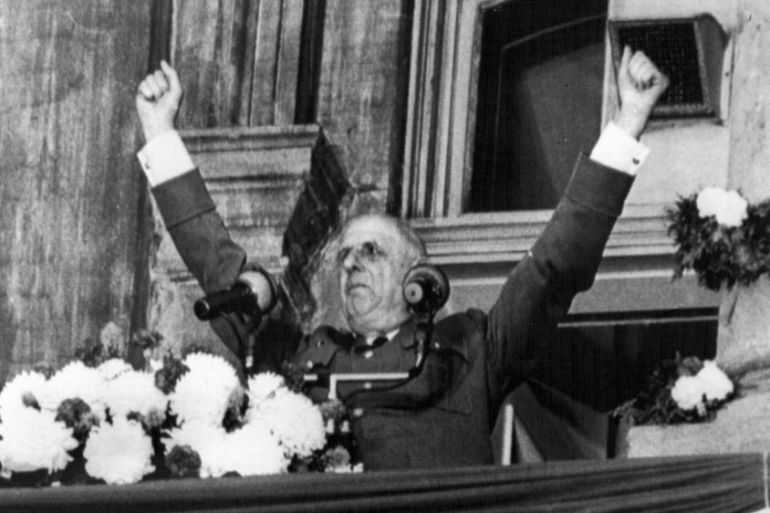Canada needs a history lesson
Let’s remember the time when Charles de Gaulle meddled in our affairs, the way we today meddle in Venezuela’s.

Apparently, Canada’s prime minister and foreign minister require a short, instructive history lesson in light of their fulsome, almost giddy, support for the attempted coup d’etat unfolding in Venezuela.
It’s not at all surprising that Justin Trudeau and Chrystia Freeland have conveniently forgotten when, several decades ago, top Canadian politicians – including Trudeau’s late father, Pierre – were livid after a foreign head of state stuck his big, signature nose into Canada’s tricky, delicate business, as they go about sticking their pretty, petite noses into Venezuela’s tricky, delicate business.
This amnesia is, of course, de rigueur among Western political dilettantes whose diplomatic modus operandi still reflects a grating, colonial-like attitude that dictates to “developing” countries – there’s one set of international rules for us, and quite another set for you. So, take heed, rather than suffer the potentially brutish consequences.
While Venezuela and its fractured people rest dangerously on the precipice, Trudeau and Freeland – a pair of so-called liberals – have elected to stand literally shoulder-to-shoulder with renowned “populists” like Donald Trump and Brazil’s new president, Jair Bolsonaro, as they prop up their youthful marionette, Juan Guaido, as the country’s “interim” president.
Now, while it’s plain that scores of Venezuelans back Guaido, millions more want the imperious Yankees and Canucks to pack up their sanctimonious lectures about liberty, democracy and human rights and go home.
Watching Trudeau and Freeland scoff at the right of Venezuelans to determine the political destiny of their own country without the familiar “regime change” subterfuge and rhetoric oozing from Washington, DC and Ottawa, I was reminded of another indelible scene when an apoplectic Canada declared former French president, Charles de Gaulle, in effect, persona non grata for attempting to split the fragile country in two.
In 1967, the towering de Gaulle, with his equally prominent nose, visited Canada during the 1967 International and Universal Exposition. At the time, the long-simmering Quebec separatist movement was gathering momentum and de Gaulle, it seems, was anxious to give it a titanic push.
On the eve of the visit, Canada’s then prime minister, Lester B Pearson, was so concerned that de Gaulle would exploit his stay to champion the separatist cause and, in doing so, intervene in Canada’s combustible politics, he dispatched his foreign minister to meet the French president in Paris to mend bilateral relations.
The diplomatic overture failed spectacularly. On July 24 that year de Gaulle stood defiantly on a balcony at Montreal’s city hall before an adoring throng of Quebecers. In his speech, de Gaulle did precisely what Pearson didn’t want him to do – step firmly and loudly into Canada’s internal affairs.
Privately, de Gaulle told his son-in-law, General Alain de Boissieu, that he planned to “strike a strong blow. Things are going to get hot. But it is necessary.” Things got “hot” all right. As de Gaulle’s address – broadcast live on radio – built to a climactic crescendo as he leaned into the microphone and, in his unmistakable baritone, bellowed: “Vive le Quebec. Vive le Quebec libre. Vive le Canada Francais! Vive la France!”
De Gaulle lingered on “libre” as if he were hurling a grenade into Canada’s already frail political psyche. The crowd exploded (in delight) and so did Canada-France relations.
Angry English-speaking Canadians deluged the liberal government with messages demanding de Gaulle be booted immediately from the country. Pearson demurred, choosing instead to issue a blistering statement slamming the meddling French leader.
“The statement by the president … [is] unacceptable,” a fuming Pearson told Canadians. “The people of Canada are free. Every province in Canada is free. Canadians do not need to be liberated … Canada will remain united and will reject any effort to destroy her unity.”
Then Justice Minister Pierre Trudeau also weighed in, wondering, justifiably, what the French reaction would have been if a Canadian prime minister shouted, “Brittany to the Bretons”.
Days later, an unapologetic de Gaulle went back to France, leaving behind a ruptured country now dealing with an invigorated separatist movement in Quebec intent on seceding from Canada. The damage was done.
Rather than learn from the lessons of the not-so-distant past when Canada became indignant at an influential outsider butting into its affairs, Trudeau and Freeland have parroted de Gaulle – an unrepentant provocateur Trudeau Sr once rebuked.
The hypocrisy is as galling as it is telling.
Reportedly, Freeland has been repeatedly in touch with the opposition upstart in the weeks and even hours before his carefully orchestrated gambit to wrest the presidency of Venezuela from Nicolas Maduro.
Freeland played a “key role” in “secret talks” with Guiado from mid-December up to his “swearing-in” ceremony on January 23.
On cue, Freeland released a statement instantly recognizing Guiado as interim president. “Canadians stand with the people of Venezuela and their desire to restore constitutional democracy and human rights in Venezuela,” Freeland said.
Countless Venezuelans, I suspect, will bristle at Freeland’s implicit suggestion that they need to be liberated and reject her explicit attempt to trespass on their future.
I also imagine that Pearson and Trudeau Sr would, at the very least, be chagrined by Freeland’s and Trudeau Jr’s naked interference. But interfere they have on a continent where previous US chicanery has left such a lasting, disastrous and painful residue.
And that, no doubt, will be the defining epitaph of Canada’s complaisant foreign minister and its dauphin prime minister – two “liberals” masquerading as “progressives” linking arms with Donald Trump and his fawning Brazilian acolyte to depose a socialist president in South America.
It’s a truism that Canada is a client state of its southern neighbour. But Brazil too? Who knew?
O Canada, indeed.
The views expressed in this article are the author’s own and do not necessarily reflect Al Jazeera’s editorial stance.
